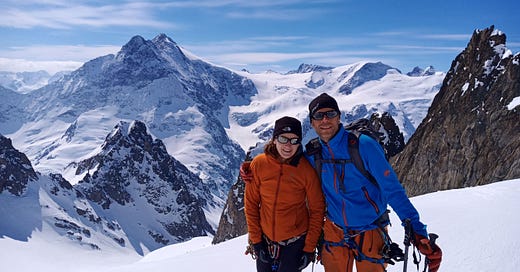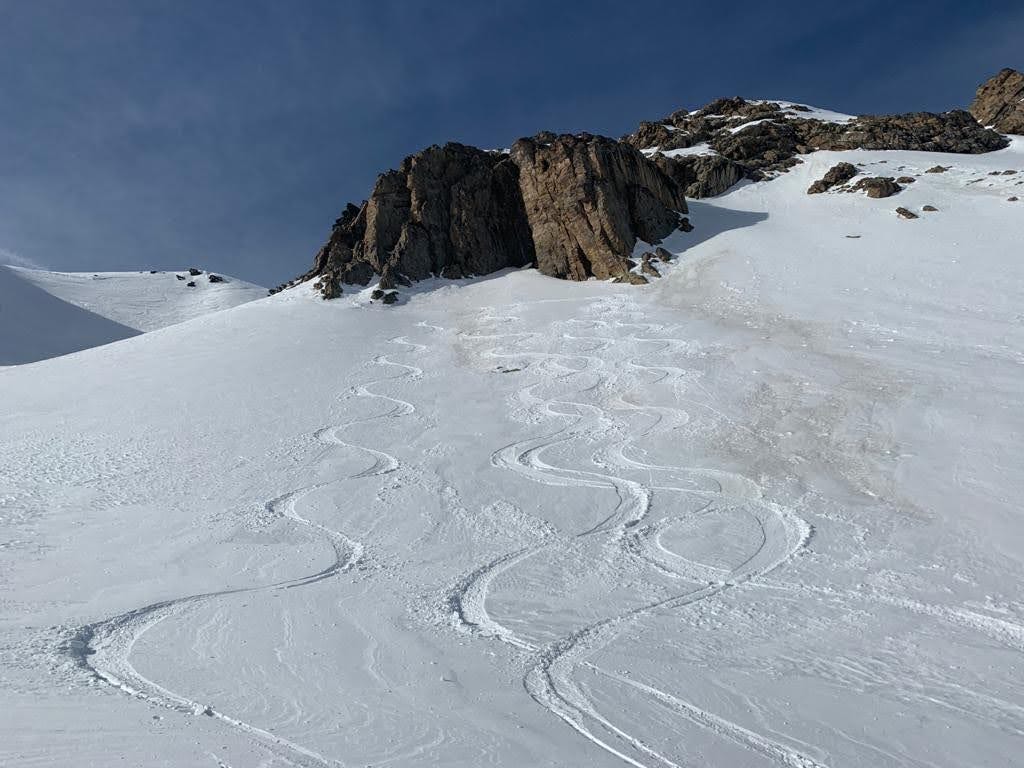On off-piste skiing, chronic illness, and ‘the nature cure’
– but not in the way you might expect
First, a gratuitous photo, which I came across while searching out others for this piece. Matthew and me, above Realp in the Swiss canton of Uri. It looks Photoshopped. It isn’t. We were doing a five-day ski tour, hut to hut. Self-evidently, we had a glorious weather window.
It’s relevant, because it was Matthew who introduced me to mountains – but also for another reason, which I’ll give you below.
Here, though, is what I’d actually planned to say.
Maybe you’ve done this. (Some of you have.) You’re skiing off-piste down an untouched snow field. The powder is four feet deep, and you’re floating, bouncing, feeling the smooth press out of your twinned legs from one side (bounce) to the other (bounce again). You can’t look backwards just now, but you know that if you did, you’d see the symmetrical curving snake of a perfect track. When you get to the bottom you’ll photograph it – it looks and feels that good.
You’re still skiing – bounce – and still – bounce –
then, in a split second, there’s an invisible lump of ice, or an unexpected change in the snow consistency, or it’s simply that your concentration has lapsed –
and one ski dives. The other skids to the surface. You’re way off balance. And you fall, your legs twisted sideways – and in that twist you hear the click of the ski bindings releasing – and now you’re face down, there’s no longer the gliding sense of infinite freedom, and instead there is snow inside your jacket – first cold and then already melting –, your limbs are weighed down, every movement is clumsy with effort, and you’re floundering.
If you’re lucky your friends, or at least some of them, are still above you. In a moment, if they are good friends, then they’ll be down to help. But if you were skiing last then they’re already far below, and there’s very little that they can do. If you’re me, you then feel frustrated, helpless, and, occasionally, tearful.
Either way, the reality is this: you’re now waist deep in loose snow and digging with mittened hands. Every movement is ungainly and exhausting. You’re breathing heavily. You’re too hot, but if you stop to rest you’ll straightaway be too cold. You’re not sure where your skis have ended up. (If the brake doesn’t engage, then a ski is largely frictionless: it could easily have travelled twenty metres below the surface of the snow.)
Most of all, from that sense of infinite freedom, you are now weighed down, clogged, struggling for any movement at all.
Since 2011 I’ve been dealing with illness. Before that I was gliding through the world. Then, for some reason, I fell. And then I was floundering merely to do the most basic things which, previously, I had done with ease.
I was also floundering to understand what had happened. Because it’s an odd thing, ‘chronic illness,’ I discovered. To start with, as a concept it’s surprisingly poorly defined.
At its most basic – for an insurance company, for example – it means illness which has lasted over a year (sometimes two; either way, it’s the point at which they stop paying out to help). Then there’s the NHS definition for what they call ‘a long-term or chronic health condition’: ‘a condition that cannot at present be cured but can be controlled by medication and therapies’. (There’s an implication there that if there is a cure in current medicine you’ll have access to it – but that’s a discussion we won’t get into here.)
(Keep digging for that ski.)
My own definition is this: ‘illness that has been long-lasting, with debilitating effects, and which has no immediate chance of a cure.’ As it happens that’s also close to the definition of ‘disability’ under the Equality Act. I’ve met the criteria since 2011.
(Try again to stand up ; then realise that the snow still won’t hold your weight.)
It’s been a feeling of floundering – everything taking much more effort than it did before. A tumble from one medium – air and a pristine surface – into another – heavy clogged snow on which I can get no purchase – and with very little idea of which way to dig to get out.
My chronic illness is also invisible – and it’s on that basis that my opening photo was not gratuitous after all. Behind the smiles I was, for whatever reason, really struggling in the mountains that week. I had been in hospital at least four times in the previous twelve months. I was clearly in one of my better phases, or I wouldn’t have been in the Alps at all. Nonetheless, my mood, breathing and energy levels had gone haywire, despite me being physically the most fit I’ve ever been. My friends were waiting for me all the time. There were a lot of tears.
Why am I bringing this up here? And why – beyond my little metaphor of sudden floundering, and this mention of the invisibility of my illness in that photo – am I pairing it with skiing?
There’s a big ‘why’ and a little ‘why’.
The little ‘why’ goes like this.
This week I picked up a book, Moving Mountains, whose subtitle is ‘Writing Nature Through Illness And Disability’. Right on my map, I’d have thought, until I discovered that the editor had made a deliberate (but silent) decision to restrict the content to physical illness.
I should say that the book is a fantastic one.
I do, though, find its primarily physical emphasis odd, in multiple ways.
My illness, as I’ve said before, is depression. It has very many symptoms and effects – far more than the diagnostic criteria describe. Currently, for whatever reason, many of them operate at least as much on my body as on my mind. Extensive fatigue. Periodic sleep disruption. Sudden wild fluctuations of adrenalin. An overactive dorsal vagal reaction.
Point one: we need to better acknowledge that so-called ‘mental’ illnesses can be chronic as well – they even affect people who are skiing –, and to remember that they often affect people in physical ways.

There is, however, a bigger ‘why’.
There’s a much talked-about concept known as ‘the nature cure’: in which spending time in nature – strolling, forest bathing, sea swimming, wild camping, skiing, climbing hills – is touted as the panacea for all ills. Richard Mabey’s book from 2005, for example, I have been told to read more times than I can count.
Clearly there are people with chronic illness for whom these activities help. Maybe for some they are even a cure. I’ve written myself about climbing and awareness, and I strongly believe that awareness is an essential component of resilient mental health. I ski, run, hike for many reasons, and one of them is often that it can make me feel good.
But I was skiing at my best and fittest that week on the Urner Haute Route, and none the less my energy fluctuated wildly and I was hyperventilatingly unwell. ‘Nature’ had not cured me. A year later it was suggested I should take up trail running to solve my depression. First, I had already been trail running for fifteen years; and, second, at that particular stage I was unable to get out of bed. Nor do people whose conditions are, say, genetic tend to find that sea swimming is a cure.
Point two: let’s stop over-promising on ‘the nature cure’. It’s invalidating, and it’s unfair.
It also – point three – underestimates nature.
Mountains in particular – but also the ocean and, for that matter wild animals, can kill us. They are not tame; they do not gently, therapeutically assist. Having been caught up in fatal mountaineering accidents I have a very strong personal interest in vouching for that.
The good thing is that being in the mountains, or ‘nature’ more generally, offers many benefits other than that of ‘cure’: perspective, meaning, pleasure, awareness, physical presence, elucidation of the world, even enlightenment. (All of those are what we see from beyond the mountain.)
And that, my friends, is what interests me. That’s why – despite the falls, and within the constraints of my floundering health – I keep going back.
As you know, this was a six-part series. This is officially part six, and therefore The End For Now.
But – I’ve enjoyed it. Lots of you claim to have done as well. So I shall aim to return with a next series, probably in the New Year. (If you subscribe now, you will of course be notified then.)
Until then, and with many thanks for (continuing to) read, like, comment, email, share, etc.
Kate x






Yes to all this. Especially the ‘burden’ of the ‘nature cures all ills’ culture. In fact the expectation that such a mindset can be damaging in itself if you then feel guilty about still feeling the way you do despite immersing yourself in the outdoors. It is also damaging to the natural world - giving it yet another ‘use’ for mankind to abuse. There is no doubt that being outside can often lift mood but sometimes you just need to hunker down somewhere safe and ride it out.
I’ve really enjoyed reading your deeply thoughtful posts & am looking forward to the next batch x
Kate, your skiing analogy is excellent. Thank you for writing about your illness and your experience so eloquently. Depression and anxiety run in my family and also in the family of my former husband, father of my three children. Two of my three have struggled with depression and, not having experienced this myself, I have struggled to understand. Your writings and openness about your situation have been very helpful.